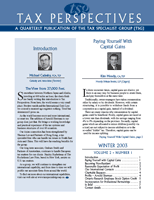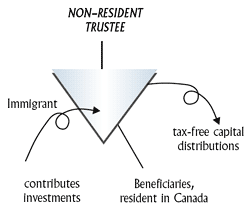
PDF Format
 Issue Contents Issue Contents
 All Issues All Issues
Winter 2003
Volume 2, Number 1
The information in Tax Perspectives is prepared for general interest only. Every effort has been made to ensure that the contents are accurate. However, professional advice should always be obtained before acting on the information herein.
Incorporation For Professional Partnerships — Some New Ideas
By Hugh Woolley, CA
Lewis and Company (Vancouver)
For decades, individual professionals practicing through large partnerships have struggled to achieve more tax efficient structures. Solutions have included the use of management companies and management limited partnerships. Rules requiring partners to share the $200,000 small business deduction have generally made incorporation impractical from an income tax perspective if a firm has more than 4 or 5 partners. In some circumstances, incorporation of an individual's partnership interest can be beneficial. For example, Alberta partners of law firms with offices in Ontario, B.C. and Quebec have frequently chosen to use incorporation as a method of converting multi-jurisdictional business income into Alberta employment income. The income is paid out as salary. A side benefit of such an incorporation is the ability to claim home office expenses which are statutorily denied to individuals unless the home is used to regularly meet with clients. As no business income is left in the corporation, the lack of any small business deduction is not an issue.  Individuals with a higher tolerance for risk, who are members of large professional partnerships, have attempted to access the full $200,000 small business deduction with the use of a "stacked structure". This involves having the partnership interest owned by one corporation which is in turn owned by a second corporation. The business income of the first corporation is paid to the second corporation as a fee for the services of the professional who is an employee of the second corporation. As the two corporations are associated, there is an exemption from the application of the personal services business rules. Individuals with a higher tolerance for risk, who are members of large professional partnerships, have attempted to access the full $200,000 small business deduction with the use of a "stacked structure". This involves having the partnership interest owned by one corporation which is in turn owned by a second corporation. The business income of the first corporation is paid to the second corporation as a fee for the services of the professional who is an employee of the second corporation. As the two corporations are associated, there is an exemption from the application of the personal services business rules.
Such structures are not without risk. Aside from various antiavoidance rules, there is a concern that the reasonableness of the intercorporate fee could be challenged. Also, such structures frequently present GST and PST issues, especially with health professionals. But a recent series of advance tax rulings issued by the Canada Customs and Revenue Agency (the "CCRA"), may provide an opportunity for some firms to reorganize their affairs to enable all of their partners to enjoy the full $200,000 small business deduction. The general circumstances involved in these rulings are: - The existing professional partnership is incorporated and the partnership's business is carried on by this new operating corporation. This restructuring can usually occur on a taxdeferred basis. It may be beneficial to undertake this restructuring at the start of the fiscal year to mitigate negative adjusted cost base issues and the loss of the 1995 reserve.
- Each individual professional sets up a new consulting corporation which contracts to provide its services to the main operating corporation.
- Each consulting corporation must carry on its own business which usually involves paying its own dues, insurance, professional development, travel and promotion expenses.
The CCRA has ruled that the individual consulting corporations will not be considered personal services businesses. This is provided the existing partnership is reorganized for various non-tax benefits such as: reduced professional liability, discretion over types of expenses and investments, greater flexibility and control over working hours and ease of entry and exit from the business. Although the CCRA has issued advanced tax rulings on several of these reorganizations, some concerns still exist. The new operating corporations will wish to deduct the fees paid to the individual consulting corporations, but this is subject to general reasonableness limitations. Where the fee is based on hours worked, which is common in medical partnerships, the reasonableness of the fee should not be an issue. On the other hand, professional firms (such as some lawyers and accountants) that remunerate their principals based on a variety of factors, including prior marketing success, may have some risk regarding deductibility of the inter-corporate fees. Also, all advance tax rulings are based on existing legislation. If a professional firm undertakes a complex reorganization and the Department of Finance changes the law, the firm could be stuck in a structure that may be worse than its current arrangements. Overall, this is an extremely positive development that is long overdue. The stance taken by the CCRA in these rulings is reminiscent of their position enabling multiple small business deductions to be claimed by co-ventures of the same joint venture. However, it would have been preferable for the Department of Finance to simply scrap the "specified partnership rules" rather than force taxpayers to undertake these complex reorganizations.
|